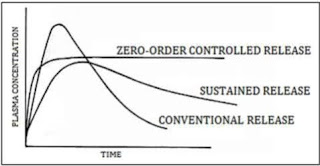Anti-diuretic hormone (ADH, Vasopressi
Anti-diuretic hormone (ADH, Vasopressin):
This hormone is released by the posterior lobe
pituitary along with Oxytocin.
Now this hormones secreest due to dehydration or any
other problem related to this.
ADH
(Vasopressin) receptors
These are G protein coupled cell membrane receptors;
two subtypes V1 and V2 have been identified, cloned and structurally
characterized.
Mechanism
of action:
When ADH (Vasopressin) bind with v1
receptor they Cause contraction of blood vessels (vasoconstriction), which
further decrease blood supply.
They also Cause
platelet aggregation so also
helps in blood coagulation. And when ADH (vasopressin) bind with V₂ receptor they increase
the CAMP (GPCR).which further activate AQP2(Aquaprin-2) receptor through which ware
transported into blood (re-absorption). They also activate Na+/K+/2Cl- Co-transporter
in Loop of henle (↑ reabsorption)
Pharmacokinetics
Aqueous vasopressin (AVP) is inactive orally because
it is destroyed by trypsin. It can be administered by any parenteral route or
by intranasal application. The peptide chain of AVP is rapidly cleaved
enzymatically in many organs, especially in liver and kidney; plasma t½ is
short
~25 min. However, the action of aqueous vasopressin
lasts 3–4 hours.
Uses:
A.
Based on V2 actions (Desmopressin is the drug of choice):
1. Diabetes
insipidus
2. Bedwetting in children and nocturia in adults.
3. Renal
concentration test.
4. Haemophilia,
von Willebrand’s disease.
B.
Based on V1 actions
1. Bleeding
esophageal varices.
2. Before
abdominal radiography.
Adverse
effects
Because of V2 selectivity, desmopressin produces
fewer adverse effects than vasopressin, lypressin or terlipressin. However, transient headache and flushing
are frequent. Nasal irritation, congestion, rhinitis,
ulceration and epistaxis can occur on local application.
Systemic side effects are: belching, nausea, abdominal cramps, pallor, urge to defecate, backache in females (due to uterine contraction). Fluid retention and hyponatraemia may develop. Symptoms of hyponatremia are due to a shift of water intracellularly resulting in cerebral edema producing headache, mental confusion, lassitude, nausea, vomiting and even seizures. Children are more susceptible. AVP can cause bradycardia, increase cardiac afterload and precipitate angina by constricting coronary vessels. It is contraindicated in patients with ischaemic heart disease, hypertension, chronic nephritis and psychogenic polydipsia. Urticaria and other allergies are possible with any preparation.





Comments
Post a Comment
Thanks